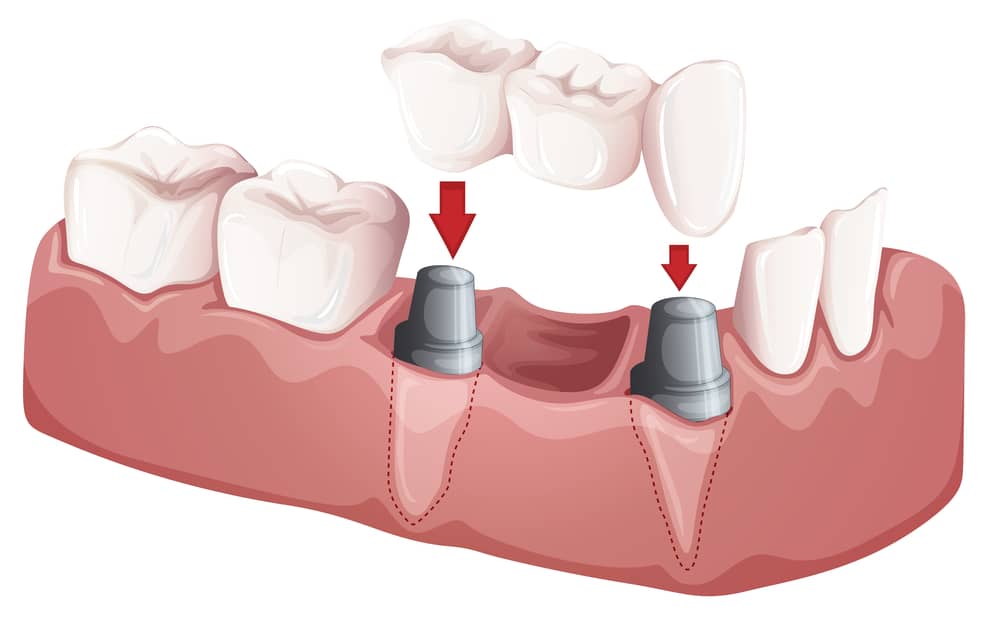Dental Crowns & Bridges In Winnipeg
- Improve the appearance of your teeth
- Stronger structure
- More protection against infections and decay
At Affinity Dental, we offer bridges and dental crowns in Winnipeg. When you schedule a consultation with us, we can examine your smile and identify a solution that’s right for you.
What Is A Dental Crown?
Crowns are used to cover teeth that are decayed or lack natural tooth structure. A dental crown will protect a vulnerable tooth from damage and restore the appearance of your smile. As the name implies, the crown is placed on top of the entire tooth; it covers the tops and sides of it.


What Is A Dental Bridge?
Dental bridges rely on the surrounding natural teeth for support. To make sure those teeth can support the bridge, a crown will be attached to each of them.
To apply a dental bridge, your dentist will begin by preparing the surrounding teeth. Those teeth will be filed down to make room for the crown. Crowns will be placed on either tooth to anchor the bridge in place. In the gap, a pontic (or artificial tooth) gets placed between the crowns.


Difference Between Crowns & Bridges
While both of these dental treatments can restore damaged teeth, there are a few key differences between them.
First, let’s distinguish what they’re mainly used for: crowns are intended to protect natural teeth. Bridges are used to replace missing teeth.
Crowns are placed on top of natural teeth or dental implants. With a dental bridge, two crowns are placed on surrounding teeth to secure the artificial tooth in place.
Can You Whiten A Porcelain Crown?
Just like natural teeth, dental crowns are susceptible to staining. However, whitening treatments are not effective with porcelain crowns. To avoid staining your dental crown, try to avoid drinking coffee, tea, red wine, or soda.
Reasons You Might Need To Get A Dental Crown
In these situations, a dental crown can help restore your oral health:
You’ve just had a root canal
After a root canal treatment, much of your natural tooth structure will be removed; this will make your tooth more prone to breaking. It will need additional support to hold the large filling, and a dental crown will do the trick.
Your natural tooth is decayed or chipped
Do you have teeth that are discoloured, damaged, or misshapen? You may be looking for a way to restore their appearance and strength.
Along with supporting your tooth, crowns also serve cosmetic purposes. They can cover any decay, stains, or chips that your tooth may have.
You have a dental implant
Dental implants allow patients to permanently replace a missing tooth. First, a titanium root is inserted into the jawbone. Then, an abutment is attached, and the crown is placed on top of it. Your artificial tooth will blend seamlessly with your smile.
How Do I Maintain My Dental Crowns?
Now that you have a new crown, you’re confident with your smile. What can you do to keep it in good condition? Follow these care tips to avoid another trip to the dental office:- Stay away from damaging foods. Certain foods can put your crowns at risk of breaking. Even though the porcelain material is stronger than a natural tooth, it’s not impervious to damage. Try to refrain from chewing ice, tough meats, and hard candies.
- Maintain an excellent oral hygiene routine. You’ve heard it all before, but it bears repeating: every day, aim to brush your teeth twice, floss once, and rinse with an antibacterial mouthwash.
- Protect your teeth. If you grind your teeth, make sure to wear a mouthguard while you sleep. You should also wear a mouthguard when you play contact sports. Try to avoid biting your nails or opening packages with your teeth.
- Visit your dentist at least twice a year. Whether or not you have concerns about your teeth, don’t skip your semi-annual cleaning! Your dentist can remove any built-up plaque or tartar to keep your dental crowns and your natural teeth in top shape.
What’s The Process For Getting Crowns?
If you have an upcoming procedure, you may want to know more about what to expect. Receiving dental crowns in Winnipeg is a lot like getting a regular filling. Here’s how the treatment typically unfolds:
First, your dentist will prepare your tooth for the crown. They’ll remove any decayed material and file it down so that a crown will fit properly. Then, they’ll take an impression of it.
Next, the crown is created in a dental lab. The crowns themselves are designed using impressions and the x-rays taken of your mouth. This is to ensure that the crown will fit the exact dimensions of your teeth. While the permanent crown is being created, a temporary crown will be placed on your tooth.
Book A Free Consultation
Looking for Winnipeg dental crowns and bridges? At Affinity Dental, we offer a range of restorative dentistry services. When you schedule a consultation, we’ll meet with you to find a solution for any damaged or missing teeth. For tooth restorations and more, contact us today.